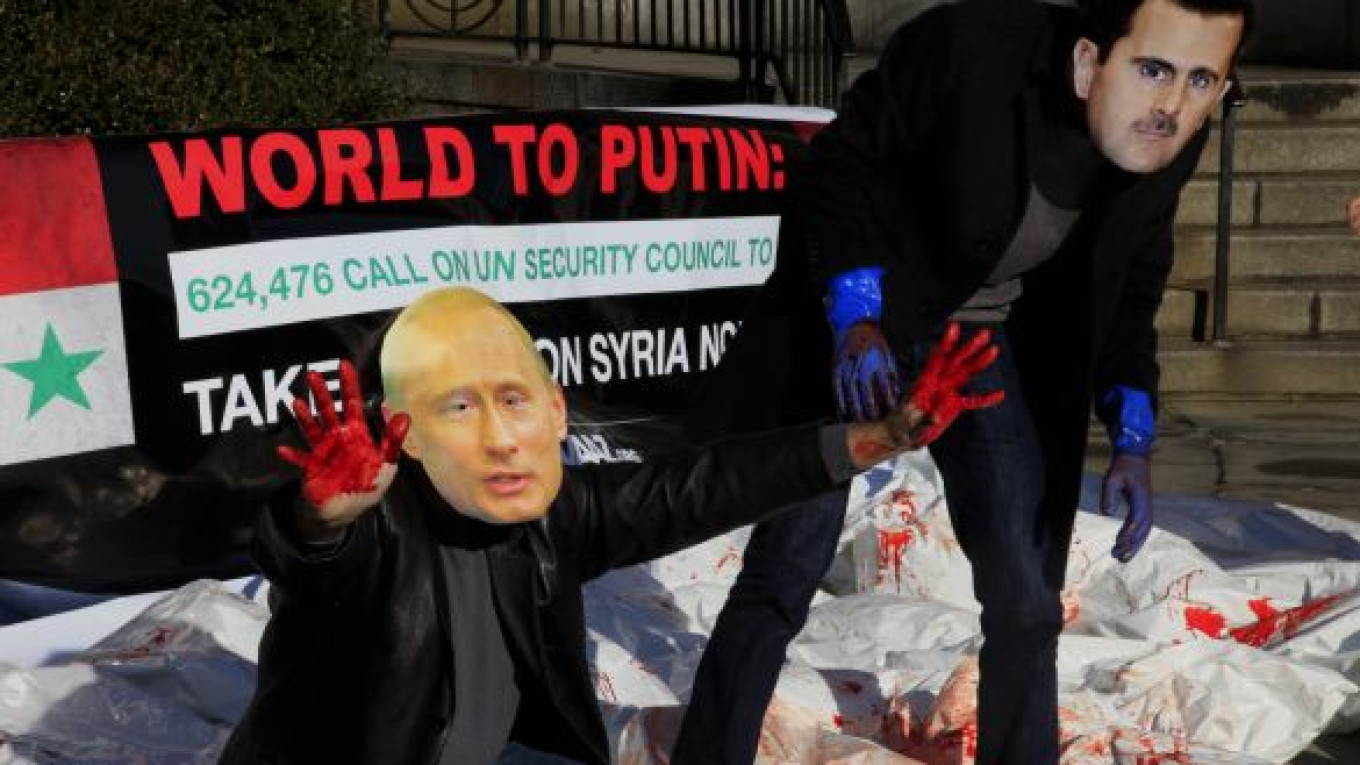Russia will stonewall any UN sanctions on Syria and will push for a quick start to talks between the Syrian government and the country's opposition, Foreign Minister Sergei Lavrov said Wednesday.
Lavrov said Moscow would block any attempts to get the UN approval for sanctions against Syria that have been imposed by other nations, saying such a move would be "unfair and counterproductive."
The United States, the European Union, the Arab League and Turkey all have introduced sanctions against Damascus in response to Syrian President Bashar Assad's violent crackdown on opponents. The uprising has left more than 5,400 people dead, according to the UN estimates.
The UN Security Council has been unable to agree on a resolution since the violence began in March because of a strong opposition from Russia and China.
Lavrov said Russia's own draft of a UN Security Council resolution on the violence in Syria, which circulated earlier this month, remains on the table, and that Moscow was open for any "constructive proposals." Western diplomats said the Russian proposal fell short of their demand for a strong condemnation of the Syrian regime's crackdown on civilians.
But Lavrov reaffirmed that any UN resolution must say clearly it "couldn't be interpreted to justify any foreign military interference in the Syrian crisis."
"We believe that our approach is fair and well-balanced, unlike the attempts to pass one-sided resolutions that would condemn only one party and, by doing so, encourage another one to build up confrontation and take an uncompromising stance," Lavrov said after the talks in Moscow with Turkish Foreign Minister Ahmet Davutoglu. "We have seen that in Libya, and we will not allow the repetition of the Libyan scenario."
Russia abstained in the UN vote authorizing military intervention in Libya, but harshly criticized NATO for what it saw as an excessive use of force and civilian casualties during the NATO bombing campaign against strongman Moammar Gadhafi's regime.
Rebels in Libya eventually succeeded in overthrowing Gadhafi, but they had enormous military support from the security alliance. NATO jets flew 26,000 sorties, including 9,600 strike missions, against Libya in 2011, destroying about 5,900 Libyan government military targets in a nine-month campaign.
Russian officials have strongly warned the West against emulating the Libyan experience in Syria.
Lavrov called for a quick start to talks between the Syrian government and the opposition, suggesting that they could be hosted by Egypt, the Arab League, Turkey or Russia.
Asked about the Arab League's call Sunday for a unity government in Syria in two months, Lavrov said Russia believes that the talks between the Syrian government and the opposition should start without any preconditions.
"We proceed from the assumption that all participants in such dialogue would seek to reach accord and show responsibility for the fate of the country and its people," he said.
Russia has been a strong ally of Syria since Soviet times, when Syria was led by the president's father, Hafez Assad. It has supplied Syria with aircraft, missiles, tanks and other heavy weapons. The 27-nation EU, in contrast, has imposed an arms embargo against Syria.
In December, a Russian ship apparently carrying tons of weapons made a dash for Syria after telling Cypriot officials it was heading to Turkey. Turkish officials said the ship went instead to the Syrian port of Tartus, which Russian warships use as a resupply stop.
A Message from The Moscow Times:
Dear readers,
We are facing unprecedented challenges. Russia's Prosecutor General's Office has designated The Moscow Times as an "undesirable" organization, criminalizing our work and putting our staff at risk of prosecution. This follows our earlier unjust labeling as a "foreign agent."
These actions are direct attempts to silence independent journalism in Russia. The authorities claim our work "discredits the decisions of the Russian leadership." We see things differently: we strive to provide accurate, unbiased reporting on Russia.
We, the journalists of The Moscow Times, refuse to be silenced. But to continue our work, we need your help.
Your support, no matter how small, makes a world of difference. If you can, please support us monthly starting from just $2. It's quick to set up, and every contribution makes a significant impact.
By supporting The Moscow Times, you're defending open, independent journalism in the face of repression. Thank you for standing with us.
Remind me later.


